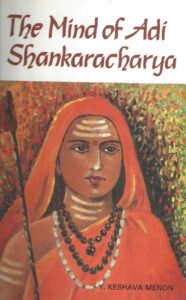The Mind of Adi Shankaracharya
By Y. Keshava Menon.
121 Pages | Published in 1976 | Jaico Publishing House, India | No ISBN.
On the intellectual level, Indian philosophy is logical and rational and proceeds on the same kind of axioms, overt or implied, as Western philosophy. Shankara was one of the most subtle of Indian philosophers, and though for him intellectual dexterity was not an end in itself, the reader will find some reasoning worthy of his steel in the following pages. Equally, however, it would be an error to bring to Shankara the same spirit of mesmerised reverance that many Christians bring to the Elizabeth English of the Authorised Version of the Bible. Reverence and blind faith are also not enough. Perhaps the most helpful thing that can be said is that the reader who wants to get the best out of Shankara should approach him with a cool, constructively critical mind, but determined to study philosophy as a whole and not to reject conclusions out of hand. There is ratiocination in plenty for him, but if he is not prepared to test the philosophy for himself, he would have gained little from Shankara.
From the Introduction (p. VII):
" Though he is considered one of the foremost of India's philosophers, Shankara is also one of the most misunderstood. We have heard fire-eating revolutionaries advance the theory that the essence of Shankara philosophy is on all fours with the materialistic interpretation of life formulated by Hegel, on which is built the edifice of Marxism. Pandit Jawarharlal Nehru, in the course of his record of the cultural history of the world, testifies to Shankara's merits as an outstanding Shaivite. In his own time, Shankara was hailed as Shanmathatshapanacharya (founder of six faiths). Obviously, all of them cannot very well be right. Much of the misunderstanding of Shankara's position may be due to the absence of a lucid presentation of his life and works in a comprehensive and readable form. This short monograph is an attempt to meet that need for the benefit of those, who have no previous acquaintance with philosophy. "
 Bezig met bijwerken...
Bezig met bijwerken...